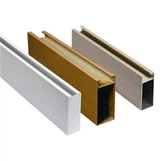As a reliable supplier of Astm B209 Alloy 3003 H14, I'm often asked about the yield strength of this particular aluminum alloy. In this blog post, I'll delve into the concept of yield strength, explain what it means for Astm B209 Alloy 3003 H14, and provide some practical insights for those considering using this material in their projects.


Understanding Yield Strength
Before we discuss the yield strength of Astm B209 Alloy 3003 H14, it's essential to understand what yield strength is. Yield strength is a fundamental mechanical property of materials, including metals like aluminum. It represents the stress at which a material begins to deform plastically, meaning it will not return to its original shape after the stress is removed. In simpler terms, it's the point at which a material starts to permanently change its shape under load.
Yield strength is typically measured in units of force per unit area, such as megapascals (MPa) or pounds per square inch (psi). It's an important parameter in engineering and design because it helps engineers determine how much stress a material can withstand before it fails or becomes unusable.
Astm B209 Alloy 3003 H14: An Overview
Astm B209 is a standard specification for aluminum and aluminum-alloy sheet and plate. Alloy 3003 is one of the most widely used aluminum alloys, known for its excellent formability, corrosion resistance, and moderate strength. The "H14" temper designation indicates that the material has been strain-hardened and partially annealed, which gives it a specific level of hardness and strength.
3003 Pure Aluminum Alloy Plate and 3003 H14 Aluminum Sheet are common products made from Astm B209 Alloy 3003 H14. These products are used in a variety of applications, including automotive parts, electrical enclosures, signage, and general sheet metal work.
Yield Strength of Astm B209 Alloy 3003 H14
The yield strength of Astm B209 Alloy 3003 H14 can vary depending on several factors, including the thickness of the material and the specific manufacturing process. However, according to the ASTM standard, the minimum yield strength for Alloy 3003 H14 is typically around 110 MPa (16,000 psi).
It's important to note that this is the minimum value specified by the standard. In practice, the actual yield strength of a particular batch of Astm B209 Alloy 3003 H14 may be higher than this minimum. This is because the manufacturing process can be carefully controlled to achieve specific mechanical properties, and quality control measures are in place to ensure that the material meets or exceeds the specified requirements.
Factors Affecting Yield Strength
Several factors can affect the yield strength of Astm B209 Alloy 3003 H14. These include:
- Thickness: Generally, thinner sheets of Alloy 3003 H14 may have a slightly higher yield strength than thicker sheets. This is because the strain-hardening process is more effective in thinner materials.
- Manufacturing Process: The way the material is processed, including rolling, annealing, and cold working, can have a significant impact on its yield strength. For example, a more extensive cold working process can increase the yield strength of the material.
- Alloy Composition: The exact composition of the alloy can also affect its mechanical properties. Small variations in the amounts of alloying elements, such as manganese and copper, can influence the yield strength.
Importance of Yield Strength in Applications
The yield strength of Astm B209 Alloy 3003 H14 is an important consideration in many applications. Here are some examples:
- Structural Applications: In applications where the material is used to support loads, such as in building structures or automotive frames, the yield strength is crucial. Engineers need to ensure that the material can withstand the expected loads without deforming permanently.
- Forming Operations: When the material is being formed into complex shapes, such as in stamping or bending operations, the yield strength affects how easily the material can be shaped. A material with a lower yield strength may be more easily formed, but it may also be more prone to deformation during use.
- Corrosion Resistance: While yield strength is not directly related to corrosion resistance, the manufacturing process that affects yield strength can also impact the material's corrosion resistance. For example, a well-controlled annealing process can improve the material's resistance to corrosion.
Testing and Quality Control
As a supplier of Astm B209 Alloy 3003 H14, we take quality control very seriously. We conduct regular testing to ensure that our products meet or exceed the specified yield strength requirements. This includes tensile testing, which involves applying a gradually increasing load to a sample of the material until it breaks. The yield strength is then determined from the stress-strain curve obtained during the test.
In addition to tensile testing, we also perform other quality control checks, such as chemical analysis to verify the alloy composition and visual inspection to check for surface defects. By maintaining strict quality control measures, we can provide our customers with high-quality Astm B209 Alloy 3003 H14 that meets their specific requirements.
Conclusion
In conclusion, the yield strength of Astm B209 Alloy 3003 H14 is an important mechanical property that plays a crucial role in many applications. The minimum yield strength specified by the ASTM standard is around 110 MPa (16,000 psi), but the actual yield strength can vary depending on factors such as thickness, manufacturing process, and alloy composition.
As a supplier of Astm B209 Alloy 3003 H14, we are committed to providing our customers with high-quality products that meet or exceed the specified requirements. If you're considering using Astm B209 Alloy 3003 H14 in your project, we encourage you to contact us to discuss your specific needs. Our team of experts can provide you with detailed information about the material's properties, help you select the right product for your application, and assist you with any technical questions you may have.
Whether you're looking for 3003 Pure Aluminum Alloy Plate or 3003 H14 Aluminum Sheet, we have the expertise and resources to meet your requirements. Contact us today to start the conversation and explore how our products can benefit your project.
References
- ASTM International. (Year). ASTM B209 - Standard Specification for Aluminum and Aluminum-Alloy Sheet and Plate.
- ASM Handbook Committee. (Year). ASM Handbook, Volume 2: Properties and Selection: Nonferrous Alloys and Special-Purpose Materials.




